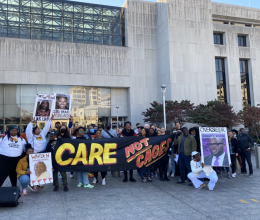Under the federal civil service laws, an employee against whom an adverse employment action is proposed (such as discharge or forced leave without pay) is entitled to a “written notice … stating the specific reasons for the proposed action.” In 2007, we won a case in the Court of Appeals for the Federal Circuit making clear that when an adverse action is based on the suspension of a security clearance, it is not enough for an agency to tell the employee, “the specific reason is that your clearance has been suspended.” Rather, the employee is entitled to be given the specific reasons for the suspension of his or her security clearance, meaning that “the employee must be given enough information to enable him or her to make a meaningful response to the agency’s proposed suspension of the security clearance.” Cheney v. Dep’t of Justice, 479 F.3d 1343 (Fed. Cir. 2007).
Rafael Cruz-Martin is an Attorney-Advisor at the Transportation Security Administration’s Office of Chief Counsel. He began working for TSA as a security screener. Attending night school, he obtained a master’s degree and then a law degree, cum laude. He has an unblemished record. But in April 2020, his security clearance was suspended, and he was suspended from his job without pay. He was told only that the suspension of his clearance was based on “potentially disqualifying information regarding your Personal and Criminal Conduct.” He has not been charged with any crime.
Mr. Cruz-Martin appealed his suspension to the Merit Systems Protection Board, which is the federal agency charged with protecting the rights of federal civil servants. But the Board ruled that giving Mr. Cruz-Martin “specific notice that the action [leave without pay] was proposed because he had no security clearance” was all the information he was entitled to get.
We agreed to take Mr. Cruz-Martin’s case to the court of appeals because the Merit Systems Protection Board has apparently forgotten what the law requires. (While TSA employees are not covered by the same civil service law that covers most federal employees, TSA’s own regulations on this topic are the same.) In our brief to the Federal Circuit, we argued that its decision in the Cheney case remains the law, and that Mr. Cruz-Martin had obviously not been given “enough information to enable him ... to make a meaningful response to the agency’s proposed suspension of the security clearance.” He should therefore be placed on leave with pay until his security clearance is either restored or revoked, and should receive back pay for the many months during which he’s been on unpaid leave.
After the appeal was fully briefed and scheduled for argument, Mr. Cruz-Martin was notified that “there was no supported evidence to substantiate the allegations” that had been made against him, and that his security clearance had been reinstated. He returned to duty on May 3, 2021. At that point the government became eager to settle the case, and it was settled on very favorable terms, with full back pay and restoration of benefits to Mr. Cruz-Martin and attorneys’ fees for the lawyers.

